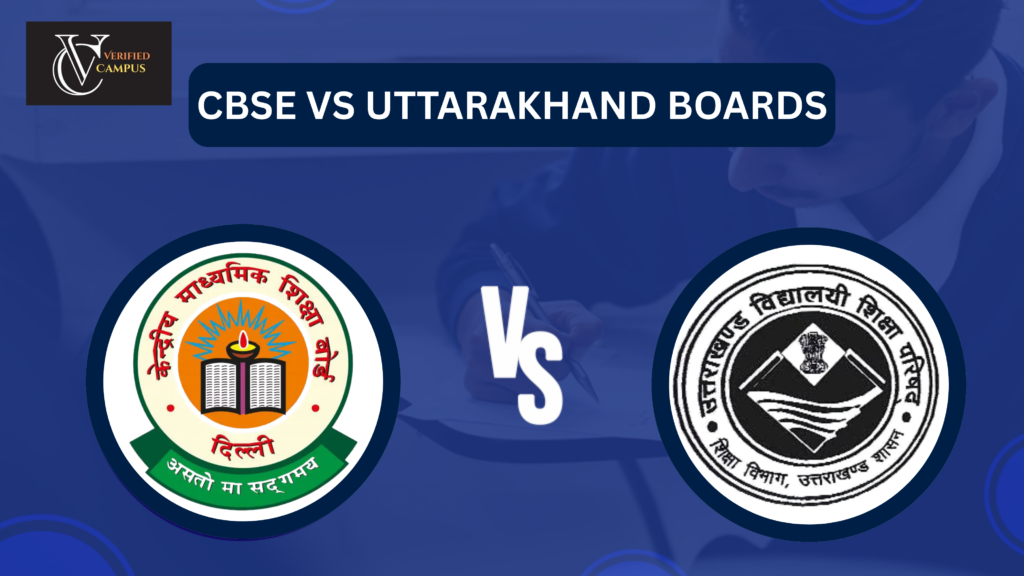When it comes to choosing the right education board for your child, one of the most debated topics among parents and educators in Uttarakhand is CBSE vs Uttarakhand Board. Whether you’re considering future academic opportunities or the overall development of your child, understanding the key differences between these two boards is essential.
Many parents residing in Dehradun and other cities often search for reliable information on CBSE vs Uttarakhand Board to make an informed decision. Educational platforms like Verified Campus provide valuable insights that simplify this complicated choice.
In this comprehensive guide, we will explore the differences, benefits, challenges, and suitability of both boards to help you confidently navigate the question of CBSE vs Uttarakhand Board.
Overview of CBSE and Uttarakhand Board
To truly understand CBSE vs Uttarakhand Board, it’s essential to begin with a foundational overview of what each board entails and how they operate within the Indian education system.
-
CBSE (Central Board of Secondary Education)
The Central Board of Secondary Education (CBSE) is one of the most widely recognized and respected national-level education boards in India. Governed by the Union Government, CBSE is responsible for prescribing a uniform curriculum across all affiliated schools, which include both public and private institutions spread across India and even in several international locations.
CBSE emphasizes a structured and balanced academic framework that focuses on holistic education, integrating co-curricular activities with academics. The curriculum is designed to foster analytical thinking, problem-solving skills, and a strong foundation in core subjects like Mathematics, Science, and English. The board conducts standardized examinations at the end of Class 10 (Secondary School Examination) and Class 12 (Senior School Certificate Examination), which are widely accepted across Indian universities and competitive examinations.
Additionally, CBSE promotes the use of NCERT textbooks and ensures consistency in academic delivery across its network. It is particularly suitable for students who may have to transfer between states or countries, as the curriculum remains largely uniform.
-
Uttarakhand Board (UBSE)
The Uttarakhand Board of School Education (UBSE), on the other hand, is a state-level board that operates under the Government of Uttarakhand. UBSE administers the educational framework for both public and private schools across the state and plays a vital role in developing region-specific academic standards.
The Uttarakhand Board curates its syllabus with a focus on the cultural, environmental, and linguistic context of the region. While it follows national educational guidelines to some extent, its curriculum is designed to cater to the local student demographic. UBSE conducts annual board examinations for Class 10 (High School) and Class 12 (Intermediate), which are necessary for higher education within the state and some other institutions in India.
Compared to CBSE, the Uttarakhand Board may have fewer resources in terms of updated infrastructure and technology integration, but it often places a greater emphasis on regional subjects and language studies, which may be beneficial for students aiming to pursue higher education or careers within the state.
Understanding the fundamental differences in governance, curriculum approach, and academic recognition is the first step in evaluating CBSE vs Uttarakhand Board for your child’s educational journey.

Curriculum and Academic Rigor
Understanding the curriculum is a major step in comparing CBSE vs Uttarakhand Board, as it directly influences a student’s academic foundation, learning style, and future opportunities.
-
CBSE Curriculum
The CBSE curriculum is developed by the National Council of Educational Research and Training (NCERT), making it standardized and consistent across all affiliated institutions. It is academically rigorous with a strong emphasis on theoretical learning, especially in Science and Mathematics. This structure is intentionally aligned with national-level competitive examinations like JEE (Joint Entrance Examination) and NEET (National Eligibility cum Entrance Test), which makes CBSE a preferred choice for students preparing for these high-stakes assessments.
In addition to core academics, CBSE also includes skill-based subjects and elective options that cater to holistic development. The focus on practical application through experiments, lab work, and projects also enhances a student’s conceptual clarity.
-
Uttarakhand Board Curriculum
The Uttarakhand Board curriculum is crafted to meet the educational needs of students within the state. It incorporates regional language (Hindi), local history, geography, and culture, making the content more relatable for the student population. While it does cover core academic subjects, the academic intensity may vary in comparison to CBSE, especially in Science and technical streams.
UBSE also conducts board examinations for Classes 10 and 12, but the preparation structure and question format are often less aligned with national competitive exams. This may present limitations for students aspiring to move outside the state or compete at a national level.
In the comparison of CBSE vs Uttarakhand Board, CBSE tends to offer a more competitive academic environment, whereas UBSE emphasizes contextual and localized learning. If your child’s academic aspirations include entrance into prestigious institutions or out-of-state opportunities, CBSE may offer a stronger foundation. However, for students who plan to build a career within Uttarakhand or prefer culturally rooted education, UBSE can be a more meaningful option.
Language and Medium of Instruction
Language plays a key role in understanding CBSE vs Uttarakhand Board, particularly for younger students in their foundational learning years.
CBSE schools typically use English as the primary medium of instruction. Hindi and other regional languages are taught as second or third languages, giving students exposure to a multilingual environment while ensuring they develop fluency in English. This language policy supports students aiming for national-level competitive exams, global exposure, and international education opportunities.
In contrast, schools affiliated with the Uttarakhand Board often prioritize Hindi as the main medium of instruction, especially in rural or semi-urban areas. While this makes education accessible and comfortable for local students, it might pose challenges for those planning to transition to national institutes or pursue careers requiring strong English communication skills.
Therefore, in the CBSE vs Uttarakhand Board context, families with ambitions for national or global education pathways may find CBSE’s English-medium curriculum more aligned with their goals.
Examination Patterns and Evaluation System
Another crucial factor in the CBSE vs Uttarakhand Board debate is the assessment method and exam structure.
CBSE follows a structured evaluation approach. In junior classes, it employs Continuous and Comprehensive Evaluation (CCE), focusing on overall growth through projects, activities, and periodic assessments. In higher classes, it combines internal assessments with a standardized final examination. The board emphasizes conceptual understanding and often includes multiple-choice questions, short answers, and case-based questions.
On the other hand, the Uttarakhand Board continues to follow a more traditional examination model. The assessments are largely descriptive, placing greater importance on written memorization and reproduction of content. This method may not encourage as much critical or analytical thinking as CBSE.
When comparing CBSE vs Uttarakhand Board, CBSE’s exam structure is better suited for preparing students for national-level entrance exams and modern academic expectations.
Availability of Resources and Study Material
A significant differentiator in CBSE vs Uttarakhand Board is the accessibility and quality of study material and educational resources.
CBSE students benefit from a well-developed system of standardized NCERT textbooks, digital content, online practice portals, mock test series, and national-level coaching institutes. These resources are continuously updated and align with the latest educational standards and entrance exam patterns.
In contrast, the Uttarakhand Board has traditionally relied on regionally published textbooks, which may not always be aligned with national standards. However, recent initiatives are working to digitize and improve content delivery in UBSE schools.
Still, the abundance of high-quality and readily available materials gives CBSE an edge in the CBSE vs Uttarakhand Board conversation.
Affiliation and Recognition
When evaluating CBSE vs Uttarakhand Board, the extent of recognition by colleges, universities, and employers is an essential consideration.
CBSE is widely recognized not just across India but also internationally. Its students are eligible for nearly all central and state-level entrance examinations, and their qualifications are accepted by major institutions and employers globally.
Uttarakhand Board, while recognized by state-run institutions and some universities in India, may not enjoy the same level of universal acceptance. Students from UBSE schools might need additional preparation or documentation when applying outside the state or country.
Flexibility and Future Opportunities
In the debate of CBSE vs Uttarakhand Board, future academic and career flexibility plays a significant role.
CBSE offers a broad selection of electives and stream options that allow students to tailor their education according to their interests and career goals. It supports stream changes, inter-school transfers, and flexible subject combinations that prepare students for modern professional demands.
Uttarakhand Board often has more rigid stream structures, and the variety of subjects offered may be limited, especially in rural schools. This could restrict students’ ability to customize their academic path or prepare for careers in emerging industries.

Cost of Education and Affordability
One of the practical considerations in CBSE vs Uttarakhand Board is the cost associated with education.
CBSE-affiliated schools, particularly private ones in urban areas, often charge higher tuition fees due to their advanced infrastructure, teaching resources, and extracurricular facilities. This can be a financial burden for some families.
On the other hand, most Uttarakhand Board schools, especially those run by the state government, offer affordable education with minimal fees. These schools serve a vital role in extending education access to lower and middle-income families across the state.
Schools Infrastructure and Facilities
In evaluating CBSE vs Uttarakhand Board, the physical learning environment and infrastructure should not be overlooked.
CBSE schools, especially those in cities like Dehradun, typically offer well-developed campuses with science and computer labs, libraries, sports complexes, and arts facilities. This enables comprehensive growth and learning.
Uttarakhand Board schools, while improving steadily, may still face limitations in terms of modern infrastructure, particularly in remote areas. Government initiatives are helping to upgrade facilities, but disparities remain.
Which One Is Better for Your Child?
So how do you choose between CBSE vs Uttarakhand Board?
If you seek academic rigor, competitive exam readiness, and national mobility, CBSE might be the better option. However, if you value regional context, affordability, and a more localized approach, Uttarakhand Board can be a viable choice.
Parents looking at schools in Dehradun should also consider the individual strengths of institutions rather than the board alone. Some schools affiliated with the Uttarakhand Board offer excellent teaching and student care.
Ultimately, the decision in the CBSE vs Uttarakhand Board comparison depends on your child’s needs, your family’s goals, and the specific school you are considering.
Conclusion
The debate around CBSE vs Uttarakhand Board doesn’t have a one-size-fits-all answer. It depends on your child’s learning style, career aspirations, and your family’s priorities.
Platforms like Verified Campus can assist in comparing CBSE vs Uttarakhand Board and help you find schools in Dehradun that best fit your expectations. Take the time to visit schools, speak to teachers, and evaluate the environment before making your final decision.
Ultimately, whether you choose CBSE or the Uttarakhand Board, the most important factor is that your child feels supported, encouraged, and inspired to learn.


